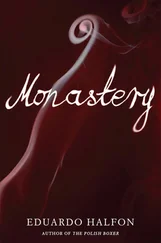Eduardo Halfon - The Polish Boxer
Здесь есть возможность читать онлайн «Eduardo Halfon - The Polish Boxer» весь текст электронной книги совершенно бесплатно (целиком полную версию без сокращений). В некоторых случаях можно слушать аудио, скачать через торрент в формате fb2 и присутствует краткое содержание. Год выпуска: 2012, Издательство: Bellevue Literary Press, Жанр: Современная проза, на английском языке. Описание произведения, (предисловие) а так же отзывы посетителей доступны на портале библиотеки ЛибКат.
- Название:The Polish Boxer
- Автор:
- Издательство:Bellevue Literary Press
- Жанр:
- Год:2012
- ISBN:нет данных
- Рейтинг книги:4 / 5. Голосов: 1
-
Избранное:Добавить в избранное
- Отзывы:
-
Ваша оценка:
- 80
- 1
- 2
- 3
- 4
- 5
The Polish Boxer: краткое содержание, описание и аннотация
Предлагаем к чтению аннотацию, описание, краткое содержание или предисловие (зависит от того, что написал сам автор книги «The Polish Boxer»). Если вы не нашли необходимую информацию о книге — напишите в комментариях, мы постараемся отыскать её.
marks the debut of a major new Latin American voice in English.
The Polish Boxer — читать онлайн бесплатно полную книгу (весь текст) целиком
Ниже представлен текст книги, разбитый по страницам. Система сохранения места последней прочитанной страницы, позволяет с удобством читать онлайн бесплатно книгу «The Polish Boxer», без необходимости каждый раз заново искать на чём Вы остановились. Поставьте закладку, и сможете в любой момент перейти на страницу, на которой закончили чтение.
Интервал:
Закладка:
The restaurant seemed to be emptying out. Lía had a sip of my beer. I stroked her forearm, and she, pouting semierotically — reminding me of a very young Marilyn Monroe, or at least of a very young Natalie Portman doing a poor but sweet impression of Marilyn Monroe — said she wanted to go. Then, exaggerating the pout still further, she said she was itching to draw in her almond-colored notebook. I downed my beer in two gulps.
Standing up, I said to Milan we’d be coming to listen to him the next day. Definitely. He hugged us both at the same time. A three-way hug, my dears, he said with a fake, forced laugh, the laugh of someone who didn’t really want to laugh.
Before we got to the room, Lía had already taken her bra off. She liked to take it off while we were driving in the car or walking along, because she knew I liked to imagine her suddenly braless. We began stopping every now and then in the middle of the street to kiss, and she’d take my hand and place it on her cold, bare breasts, shuddering as though no one had ever touched her there. It was hard to tell, tight in each other’s arms, which one of us was trembling. Maybe neither. Then we’d carry on walking, impatient, a little giddy. The bra in her handbag or maybe forgotten on the ground or maybe dangling like some enormous black pod from the branch of a tree.
Then the uproar of beer and tequila sex. A naked thing that trembled with a thousand legs and a thousand hands and a thousand guava-flavored tongues that could never be enough to make love with. Not saying a word or at least not saying words that made any sense, which always mean more. We ended up half-asleep, connected, inseparable, never finishing (sex is always better in gerunds), until at daybreak I heard the far-off cry of a child or a rooster and felt a breeze across my chest and saw her warm and sitting up in bed. She glowed amber. The almond-colored notebook was open on her lap.
Lía used to draw her orgasms.
Since our first time, whenever we finished, she’d get up, make her way across the room completely naked, and come back to bed with a small almond-colored notebook. Then, leaning on one elbow or sitting or sometimes kneeling, she’d begin to sketch the orgasm or orgasms that she’d experienced and that were still fresh in her vaginal memory; to make graphs of them for me, like a scientist would, with everything from convulsions to climaxes, spasms, changes in temperature, and liquid overflows. In general she’d sketch a line that would resemble a mountain or a series of mountains of different heights and widths. Sometimes the plateau was short; often it was round; sometimes it extended horizontally for what appeared to be several kilometers. From somewhere, almost always (but not always) out of a crater, fluvial jets would burst up. Bristling, zigzagging lines would spring out very sporadically on the slopes, like miniature lightning bolts, but I’ve no idea what they meant: that was her one secret, she used to say, and it was of the utmost importance. So, whenever one of these zigzags sprouted up, I’d feel ludicrously satisfied without knowing why. Other times, though, it wouldn’t be mountains she’d draw, but clouds or cotton spirals or something of the kind: throbbing, dense, closed ellipses. She explained to me that she didn’t know how else to represent it, that this was how she perceived her whole body: as a light, palpating mass. I envied her. Other times, the drawing would resemble a grapevine without any grapes. Other times: a knot of electric cables set on top of a post. Other times: a prickly fossil. Other times: the map of some African country, perhaps Angola or Namibia. Only once, on a night in that same room in Antigua, had Lía told me it couldn’t be drawn, her head buried in my shoulder, possibly crying, trembling meekly, her warm vagina dampening my thigh as the last little drops of some ineffable pleasure drained away. And again I envied her or maybe I envied the whole female sex. But usually she’d carry out her studied scribbles with the dedication of a Flemish painter, revealing to me the details, the signs, the keys to interpret her most unfathomable mysteries.
With my eyes closed, I caressed her bare back and began to dream of an archipelago of freckles. I could hear the rustling sound of the pen as it glided over the paper, followed by a brief silence, and then the rustle of the pen again. I felt a kiss on my belly. Ready, Lía said, and curling up beside me, passed me the notebook.
A raging sea viewed from a small boat.
That was what the sketch looked like. I wanted to ask her what it meant, but I felt her rhythmic breathing on the back of my neck and almost immediately fell into a deep sleep as well.
I don’t know if it was when I woke up or if I was still dreaming when I remembered that Liszt had been the lover of a princess who was related to Wittgenstein, and had also been Wagner’s father-in-law. I told Lía this and she, emerging from the white sheets, lazy as a snake shedding her skin, said it was time for a shower.
We had coffee and champurradas in the hotel restaurant. Wet patches from Lía’s chestnut-colored hair adorned her grayish T-shirt. She chatted away about her dreams (she always remembered them in great detail). Listening to her, it occurred to me that her husky, ethereal voice sounded as though she was talking to me completely submerged in a bathtub of milk.
The audience inside the ruins of San José el Viejo was murmuring bashfully. The air was cold, congealed, as if still for centuries, and an exquisite light spread harmoniously throughout the great vaulted space. Ranks of folding chairs had been set out facing a grand piano that rose up ahead of them, a solitary thing on its raised platform. I thought of a black ship about to set sail.
We took seats in the back row. Lía shushed warm kisses in my ear. A boy of three or four was kneeling on the seat in front and every so often he’d turn around and, slightly mischievously, stare at us with his little macadamia face. Look at him, Lía said, they’ve got him wearing a tie. Hello, handsome, she said to him, and the boy, blushing, grabbed hold of his mother.
The murmur of the audience died down. A man had clambered up onstage and was smiling smugly as he presented an aberrant biography of the Serbian pianist that he’d most likely only just memorized. He said that Mr. Rakić was from Belfast, had studied under Bazar Lerman in New York, and was now living in Italy. The audience — ever cowardly, as a stuttering friend of mine once put it — applauded all the same.
Milan emerged and sat straight down at the piano. He remained silent, with his head bowed, hands on his thighs, and maybe his eyes closed, although given the distance and the way that his straight hair hung down over his face like a black curtain, I couldn’t be sure. But that was how it looked. I thought at first he was waiting for people to be quiet, but then, after the quiet had come, I thought maybe he was reviewing in his mind all the pieces he was going to play (there weren’t any scores), but after that, when more than a minute had passed and people, somewhat perplexed, began looking around, I thought maybe he’d just awakened and had a filthy hangover and couldn’t remember a thing, neither how to play the piano nor what the hell he was doing in a ruin in Guatemala, and least of all why he might have abandoned his beloved Belfast.
The piano began to trickle like water in a slow cascade. Too gentle and sweet, too serene for the Chopin mazurka the program notes claimed it to be. Lía squeezed my arm. It’s Beethoven’s Pathétique she whispered, frowning, holding the piece of paper up to her face and then moving it away, hoping, I suppose, that the words would change with the angle of light, like a hologram. I shrugged, resigning myself to it. I think Milan was playing the third movement, but it could just as easily have been the second or the first. A woman to my right seemed to have fallen asleep. The boy in front was standing on his chair, listening with the genuine surprise of a child still young enough to let people dress him up in a little tie. He shouted something at his mom. She tried in vain to make him sit down. Lía smiled. For some reason, Beethoven’s sonatas always make me feel like changing the world, or at least changing out of my own world. I closed my eyes for a time and imagined all the rings on Milan’s pallid fingers pounding the ivory. Then silence. A round of applause. I opened my eyes and found the boy looking at me, curious, steady, barely blinking. You scare him, Lía said. I made a face like a wild leopard and he almost fell off his chair.
Читать дальшеИнтервал:
Закладка:
Похожие книги на «The Polish Boxer»
Представляем Вашему вниманию похожие книги на «The Polish Boxer» списком для выбора. Мы отобрали схожую по названию и смыслу литературу в надежде предоставить читателям больше вариантов отыскать новые, интересные, ещё непрочитанные произведения.
Обсуждение, отзывы о книге «The Polish Boxer» и просто собственные мнения читателей. Оставьте ваши комментарии, напишите, что Вы думаете о произведении, его смысле или главных героях. Укажите что конкретно понравилось, а что нет, и почему Вы так считаете.












